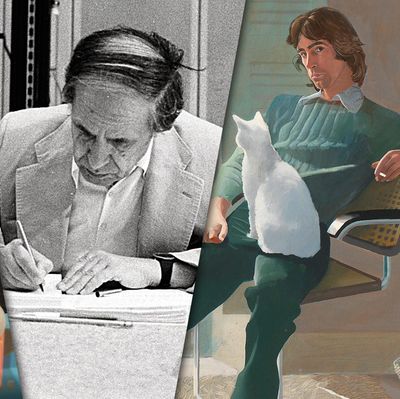
TV
Curb Your Enthusiasm
HBO, 10 p.m., October 1
Actor-writer-producer Larry David has fashioned a second (third?) career out of keeping people in suspense about whether he’d make more seasons of his dyspeptic masterpiece; he has always come back, maybe because there’s always some indignity, real or imagined, to rant about. No political details were available at press time, and that’s probably for the best. David’s brand of aggrieved passive-aggression is always much funnier when it’s blindsiding you. —Matt Zoller Seitz
ART
David Hockney, the Metropolitan Museum of Art
11/27–2/25
No one does radiant color and pictorial unfolding in ways as endlessly inventive as the now-80-year-old David Hockney, our living maestro of the Lightness of Being. Openly gay, mingling with high and low culture as new artistic worlds were forming and old ones falling away, Hockney celebrated sybaritic and serious life — but also the abstract complexities of time, light, shadow, permanence, and transience. At the Met, you can behold a sampling of this English master’s half-century: drawings, films, iPad sketches, paintings, and more. Don’t miss the films he’s made about art either; they are among the most insightful I’ve ever seen. —Jerry Saltz
THEATER
Thomas Ostermeier’s Richard III
October 11 through 14, BAM
Forget Julius Caesar. For full-throttle rage-against-the-machine Shakespeare, I’m holding out (and holding my breath) for director Thomas Ostermeier’s German-language Richard III, coming to BAM’s Next Wave Festival from the Schaubühne Berlin. Ostermeier, who began his career as an actor, became an enfant terrible among German auteurs in the 1990s by bringing the visceral, can’t-look-away dramas of British playwrights like Sarah Kane and Mark Ravenhill to his home country. He then turned to the classics, putting canonical behemoths like Hamlet and Ibsen’s A Doll’s House through the wringer of his grimy, explosive aesthetic (he calls it “new realism” and has described it as a kind of revenge on the stupidity and violence spawned by a merciless capitalist world). Ostermeier’s Hamlet was the beautiful and terrifying German actor Lars Eidinger, who now returns as Shakespeare’s hunchbacked Man Who Would Be King. The text is translated and adapted by Marius von Mayenburg, whose play The Ugly One (a hilarious and horrid assault on our obsession with skin-deep beauty) might actually be a perfect appetizer for Richard III. There will be dirt, there will be glitter, there will be blood. —Sara Holdren
BOOKS
Unreconciled: Poems 1991–2013, by Michel Houellebecq
FSG, September 5
There may be a state that’s worse than despair: a point where you feel you’re near despair but haven’t achieved it. That’s an emotional register familiar to readers of Michel Houellebecq’s novels, and it’s a mood distilled to a high degree of purity in his poetry, which appears this fall for the first time translated into English in Unreconciled: Poems 1991–2013. “In a way,” Houellebecq writes, “it is annoying to note that I have kept the capacity to hope.” Houellebecq is the reigning gargoyle of literary Paris, and in his verse we see him move from morbid pessimism through misanthropic surrealism to nostalgic equanimity. There’s a bleak beauty to Houellebecq’s later poems: Many of them sound like prayers. —Christian Lorentzen
CLASSICAL
Pierre Boulez’s Répons
October 6 and 7, Park Avenue Armory
The composer, conductor, and provocateur Pierre Boulez died last year at 90, and it will take many more years to sift through his innovations. In the 1970s, as music director of the New York Philharmonic, he befuddled audiences by taking all the seats out of the concert hall and replacing them with rugs and cushions. When I heard his Répons at Carnegie Hall in 2003, he had gotten rid of the seating again, covering it in scaffolding and terraced platforms. The audience encircled a central stage and was in turn ringed by speakers and performers. Plunged into a swirling asteroid shower of sound, we merged with the music. In October at the Park Avenue Armory, the Ensemble Intercontemporain, led by Matthias Pintscher, will play it twice, allowing listeners to change places and reexperience the sonic landscape. —Justin Davidson


